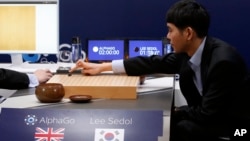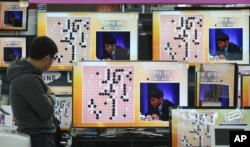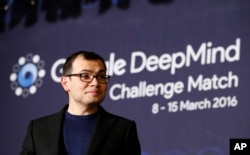South Korea and Go fans are in shock after Google's computer program, AlphaGo, defeated world champion Lee Sedol in the first of a five-game matchup Wednesday.
“I was very surprised because, I did not think that I would lose the game,” said Lee, 33, the reigning world champion of the ancient Chinese board game Go. "In the beginning, I thought AlphaGo would face a lot of difficulties, but its solution ability during the game really surprised me."
AlphaGo is an artificial intelligence (AI) program developed by Google's DeepMind team. It uses "reinforcement learning," meaning the program plays against itself and adjusts its own neural networks based on trial and error, its creators said.
Professional player
Lee, who became a professional Go player at the age of 12, has won 18 world championships. He said AlphaGo's early strategy was “excellent” and that he was stunned by one unconventional move it made that a human never would have played.
Despite his initial loss, Lee said he did not regret accepting the challenge. “I had a lot of fun playing Go and I'm looking forward to the future games,'' he said after the match in Seoul.
The five-game match will run through next Tuesday, with the second game scheduled for Thursday.
Demis Hassabisï, co-founder and CEO of Google DeepMind who is also the director of the match, said he expects Lee to come up with new strategies in the next showdowns that will test AlphaGo.
However, Hassabisi said, "We are very excited about this historic moment. We are very pleased about how AlphaGo performed."
Hundreds of thousands of people watched the game live on TV in Asia and on Google's DeepMind YouTube channel, The Associated Press reported.
Google DeepMind is offering $1 million in prize money for the winner. If AlphaGo wins, the money will be donated to charities.
Major victory
AlphaGo's victory is seen as a major breakthrough for AI.
Go, which originated in China more than 2,500 years ago, is a complex game with an almost incalculable number of move options. The game involves two players who take turns placing black and white stones on a grid-shaped board. The winner is the player who manages to seal off more territory.
Go has been viewed as a grand challenge for AI because the computer must be capable of employing human-like "intuition" to win.
The most famous AI victory to date was in 1997, when the IBM-developed supercomputer Deep Blue beat then-world class chess champion Garry Kasparov.
Still, the loss shook the South Korean Go community.
"I was shocked. Everyone was," said Kim Sung-ryong, a Korean Go commentator and professional player.
However, Yang Jae-ho, general secretary of the Korea Baduk Association, said he hopes the match between human and AI will help promote the game, which has not been as popular as it has been in the past.
Some material for this report came from AP, Reuters and AFP.
WATCH: Google DeepMind's Go challenge















